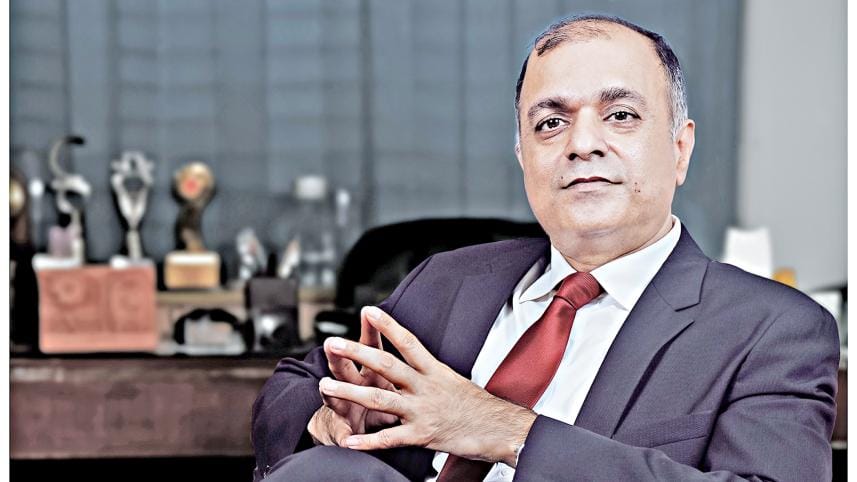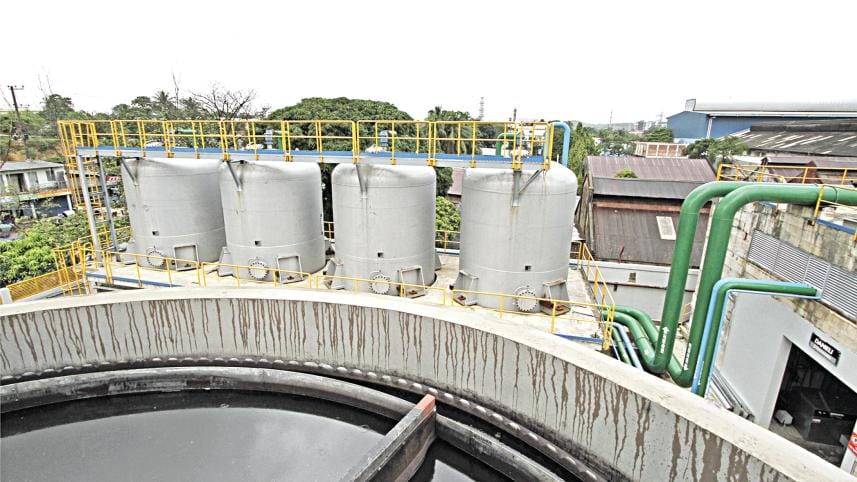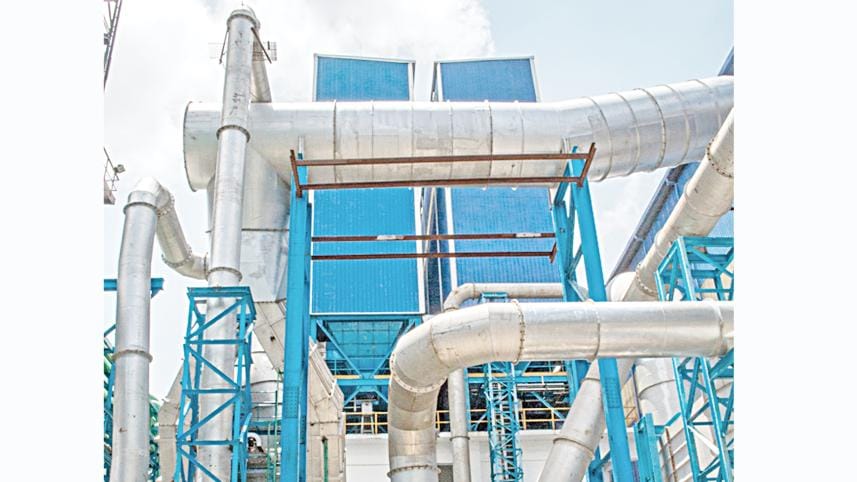BSRM is leading sustainability with the lowest utility use and the highest standards

Aameir Alihussain
Managing Director, BSRM
The Daily Star (TDS): What specific green practices or innovations helped your factory secure the Green Factory Award 2025?
Aameir Alihussain (AA): Our organisation has a longstanding institutional culture where we actively encourage, invest in, and strive to implement environmentally friendly practices. We devote our time, effort, and mindset to this cause. Within the organisation, we regularly hold discussions and meetings to strategise on how we can further implement green practices.
We have an environmental policy that aligns with national laws as well as the UN's SDGs. At our production centres, we have installed modern air pollution control systems and invested in state-of-the-art water treatment plants. These facilities treat used water for reuse, thereby reducing water wastage.
We also place strong emphasis on waste management generated from our production processes. Instead of relying solely on dumping or landfilling, we have invested in ways to reuse and recycle this waste. To this end, we have established a dedicated waste management processing plant, which can be seen as a pioneering initiative in the industry. While many industrial facilities in other countries simply discard such waste, we are making efforts to ensure its reuse or export.
Whatever we extract from that process is either reused or exported. As a result, we are no longer generating waste in that way. It has taken us many years to reach this level. We collaborated with a supplier on R&D to figure out how we could better manage our type of waste.
We place strong focus on ensuring that any technology we adopt must be top-tier and environmentally compliant. Otherwise, we don't compromise—we simply don't invest. That's our philosophy.

Additionally, we are now implementing rooftop solar installations as part of our strategy to mitigate carbon emissions. We already have two rooftop solar systems in place, and more projects are in the pipeline. This initiative will continue, so that we can reduce our carbon footprint. With solar energy, our electricity consumption from the national grid decreases, which also benefits the country. The government, too, has set a target to generate a certain percentage of power from renewable sources within a specific timeframe, and our initiative supports that.
We also regularly conduct environmental risk assessments and take measures to mitigate any potential hazards. This is a continuous process for us. Our organisation is unique in that we have a Chief Risk Officer whose responsibility includes not only business-related risks but also environmental risks. Very few companies in our country have a dedicated position like this.
We are among the lowest consumers of electricity, gas, and water—not just in Bangladesh, but even when compared to internationally recognised companies operating at high standards. We maintain minimal consumption through smart technology choices and an operational culture that emphasises efficiency. That's how we manage to produce every tonne of steel with very low utility consumption—something that is both a best practice and a competitive advantage for us.
We are also currently running another programme in our organisation, which has been underway for about a year—it's part of a long journey. This is our TPM (Total Productive Maintenance) initiative, where safety, health, and environment are integral components. TPM is based on Japanese principles, and we are implementing it with the support of consultants from Japan.
TPM helps our employees organise their workspace better and identify potential breakdowns before they occur. Even a breakdown at the plant has environmental consequences—if the plant shuts down, gas consumption continues even though production stops. So preventive maintenance is a very important practice that also contributes to environmental consciousness.
We've even set up an entire factory to process waste, and we now sell it to block manufacturers as a cheaper alternative to stone chips. Their production costs go down, profitability goes up, and at the same time, it contributes to our green objectives and environmental goals.
Another by-product from our process is mill scale, which contains iron content. We reuse some of it internally and export the rest—mainly to China, where large steel plants with blast furnaces can effectively use it. It's highly beneficial for them, and we've developed that export market ourselves. This not only reduces waste but also generates foreign currency income for us.
Similarly, from our air pollution control system, we collect dust particles. We invested in a system to recover those particles, and the dust contains zinc. We export that as well, and it is processed abroad to extract and produce zinc.
Now, to make a domestic zinc-recovery plant viable, a certain volume of input is needed—which our country currently doesn't generate. But in the future, it might be possible. These types of initiatives make me feel proud and happy—they are a recognition of years of sustained effort by our team.
TDS: What challenges did you face in implementing sustainable practices?
AA: There are always challenges—business challenges and organisational culture challenges. We have put a huge amount of effort into building this culture. There have been extensive training programmes, awareness campaigns, meetings, and discussions. We send people to relevant seminars abroad. Gradually, over time, the culture within our organisation has changed.
The second challenge is the business challenge—investment. Initially, when you look at some investments, you may not see any return. It's an extra investment in the plant. But for us, as an organisation, investment in the plant is a normal part of any feasibility calculation. If there is no investment, the project should not be done. You invest first, and later you assess whether the steel industry will be able to sell the products, repay bank loans on time, and fulfil financial commitments. This is a normal part of any investment.
The equipment we initially installed did not perform successfully at first. Then we reworked it—identified where the problems were—and redesigned the entire system to manage it better. Eventually, and quite recently, we succeeded. To achieve this, we adopted the latest modern technology at our plant, so that it has minimal impact in terms of carbon emissions and waste generation.
Eventually, when environmental rules and regulations become strictly implemented everywhere, these suppliers will have no choice but to provide environmentally compliant technology. No investor will accept non-compliant equipment, because their reputation will suffer. This change is already happening, and it will continue.
TDS: How do you see the value of this environmental award for your organisation?
AA: I think the first major achievement of this award is that it serves as recognition of the efforts we've made so far. More importantly, it will encourage and reinforce our commitment to continuing the journey towards environmental compliance. It provides psychological motivation and strengthens our belief that we are on the right path. This is exactly how it should be.
Secondly, our company's image improves. When the image improves, your brand improves, your sales improve. When you comply with government laws, you won't face fines or penalties. Your example encourages other industries to follow your lead and reach this level. This motivates us a lot and helps create a good working environment in the entire country.
These initiatives have also created export markets for us. We sell processed products abroad, earning foreign currency, which benefits the country. Our investments are gradually paying off. The slag chips we provide to block manufacturers reduce their costs and improve their business. This creates a sales market and benefits the entire supply chain.

TDS: What are your plans for further expanding and strengthening green initiatives within your operations?
AA: Our commitment is to remain on this journey—never-ending, always ongoing. We work with the government on how to better use materials. As the country grows, so will the industry. More industry means more waste generation. We must plan how to manage this future waste. Environmental standards will become stricter over time. If we don't prepare beforehand, we won't be ready when the guidelines come.
This is why continuous effort and improvement are vital. At the World Economic Forum, UN, and other global platforms, environmental discussions have begun and are progressing. We are all on this journey together.
TDS: What kind of policy or institutional support would you like to see from the government to help sustain and scale your green efforts?
AA: At the end of the day, what happens in the country and what companies drive must be supported by top-level government policies, philosophies, rules, and regulations. These need to motivate everyone to comply, because if we don't, we won't be able to survive in the market. Customers will question us and may refuse to buy from us if we are not green or environmentally responsible.
This motivation should come from the government. However, what we notice at the institutional level is a missing piece: the government should create a more proactive and supportive environment for environmental initiatives. For example, we have been processing steel waste into slag, that serves as an excellent substitute for traditional materials like bricks and macadam, particularly in road construction and is taking a long time for the government departments to include this item in the construction schedules of the Public Works Department (PWD), the Local Government Engineering Department (LGED), the Roads and Highways Department (RHD), etc. In many countries abroad, slag chips are used in road construction and government encourages use of such materials for promoting environment.
We need the government to recognise and include such sustainable materials in official standards and policies. They can support this by providing non-refundable tax credits or incentives to companies investing in green technologies, rather than just imposing fines and penalties. Punishment alone is not a solution; motivation and facilitation are key.
If the government creates a structured policy where companies can get tax credits for positive environmental actions—verified by audits and milestones—it will encourage industries to invest more willingly.
For example, we have invested in new technology with foreign partners to improve processes like reducing lead emissions from furnaces and utilising agricultural waste. These initiatives can lead to better environmental outcomes and protect agricultural lands by reducing chemical usage.
We must foster collaboration between industries, government agencies, and research institutions to share knowledge, host seminars, and develop enforcement mechanisms with clear timelines and consequences—encouraging compliance through support rather than punishment. The government should actively promote green initiatives in business, ensuring that bureaucracy acts not as a barrier, but as a facilitator of sustainable business.
The interview was conducted by Priyam Paul.




 For all latest news, follow The Daily Star's Google News channel.
For all latest news, follow The Daily Star's Google News channel.
Comments